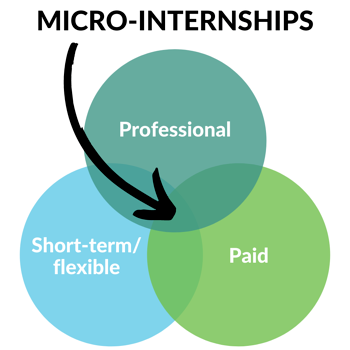Internships - General Information
What is an internship? This is usually a paid position with a company where you can learn in a real-world environment about the career you are working toward in your degree. This can be a job with a company specifically in your industry or it can be a job in your intended field in any type of company. For example, you could be studying real estate and go to work with a big real estate company in any role, or you could be an accountant and still go get a position at a real estate company, only this time you’d be targeting a job in the accounting department of a real estate company.
How do I get an internship? It’s like any job, you apply for positions at companies who have advertised openings through the career center or other channels. Or… you get out there and do what many people do and CREATE your internship by identifying a company you’d like to work for and doing the work of contacting them, reaching out to their personnel / HR department, sending a resume, making it happen! If you sit around and wait for a job to land in your lap, you may be waiting a long time. (Same goes for AFTER you graduate).
What if I already have a job? That’s OK, if you can convince your company to give you some added responsibilities, something related to your chosen job/career and they’ll provide the necessary help evaluating your performance, your current job may work also! The key that your faculty supervisor will be looking for is making sure you’re not trying to get course credit for what you already do, have done, and/or something unrelated to helping prepare you for your career direction. Ideally, you’ll be working with or under the supervision of someone who is currently in the position you will be seeking upon graduation.
What are the next steps?
- First find the job (or develop the project/assignments at your current job)! Talk to your faculty advisor and visit MTSU's career center for some current opportunities via the career center's Handshake app.
- Your supervisor must provide the internship coordinator with your job description, expected work hours, and job length. The internship coordinator is the faculty member who is assigned as the instructor for the internship course credit that you seek. The internship coordintor evaluates your position and decides if it creates a learning opportunity in your field that is roughly equivalent to a 3-hour elective course.
- If approved, the internship coordinator will notify the department secretary to enter your permission in the registration system.
- Register for the course credit and pay your tuition! (ECON4890 or FIN4890)
- Do an awesome job during your internship term. Towards the end of the term the internship coordinator will help you setup an opportunity to speak to other students in a class about your internship experience. This short talk documents your learning while providing a learning opportunity for other students as well.
Is this difficult? Well of course it’s difficult. That’s exactly why internships are such a differentiator. Don't be lazy and expect other people to the items above for you! People who get internships are the people who work hard and are creative to get internships and that’s exactly why they’re valuable. Your faculty are here to help guide you and give you advice on navigating the internship process – but it’s up to you to make it happen. And If you do, it will make a difference and so will you!
Non-credit Internships? Suppose that you want to do an intership for the experience/pay and not for the college credit. If so, consider using the Parker Dewey program to gain access to micro-internships. These opportunities will allow you togain valuable experience while getting paid to do so. Unlike a traditional internship, these paid opportunities typically range from five to 40 hours of work in total, and many can be completed remotely. Micro-Internships provide opportunities to build skills, explore career options, connect with alumni, and prove themselves to prospective employers. For busy professionals and businesses, Micro-Internships offer a solution to short-term staffing and project needs. When students access the site they are able to see jobs posted nationally, many of which can be completed remotely. To learn more about how to take advantage of this opportunity view the IGNITE webinar (9/14/22).




